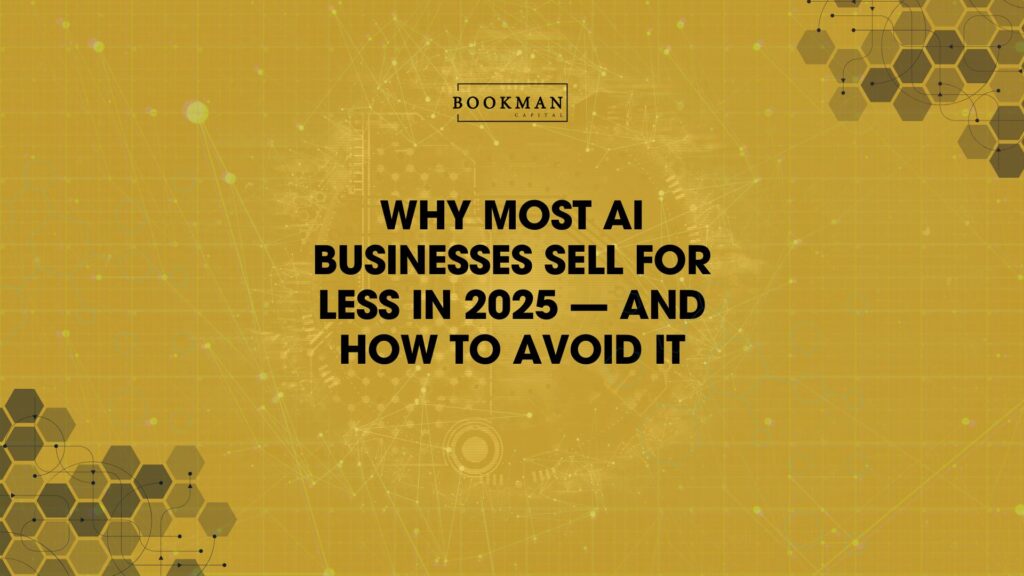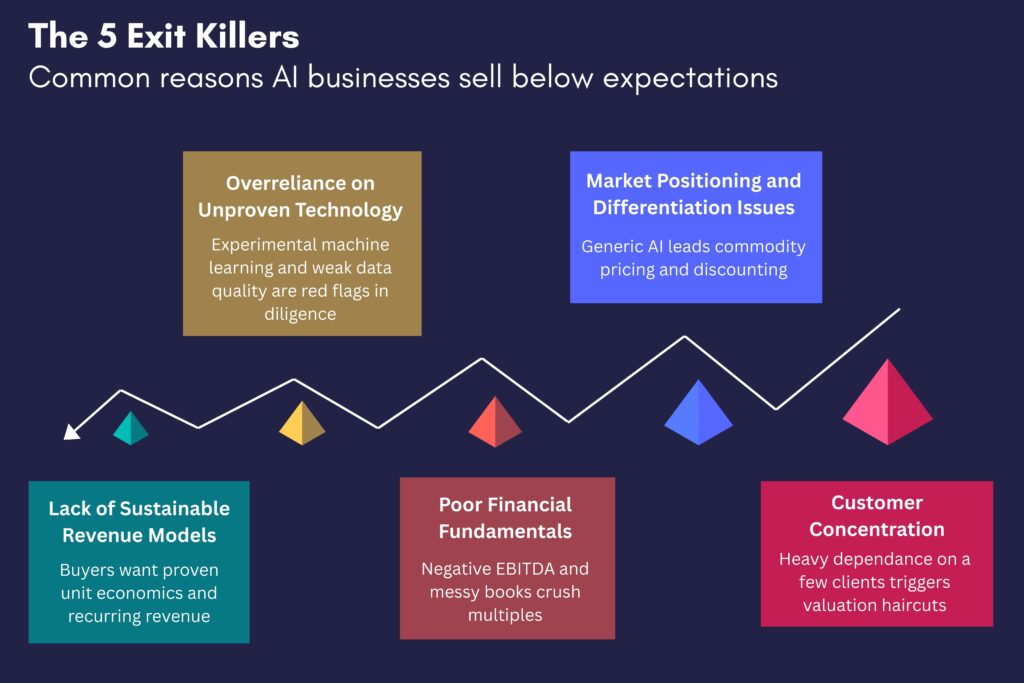
So you’ve built an AI business and you’re thinking about selling. Congratulations! Here at the cutting edge of technology, we understand that selling your AI business isn’t just about finding a buyer—it’s about getting the value you deserve for all your hard work and innovation.
The reality? Most AI businesses sell for far less than their owners expect. But here’s the good news: with the right preparation and understanding of what buyers actually want, you can position your business to command premium valuations.
We’ve put together this comprehensive guide covering everything you need to know before taking the leap, including why AI businesses often underperform in sales, what actually drives valuations, and how to prepare for a premium exit.
The AI Valuation Reality Check
Current AI Valuation Landscape
AI startups have commanded high funding multiples with median revenue multiples reaching 25.8x in recent venture rounds according to Aventis Advisors’ 2025 analysis. However, venture capital funding multiples rarely translate to actual sale prices during acquisitions.
Private equity investors focus heavily on sustainable business models. They prioritize companies with proven revenue streams over those relying purely on growth projections. This shift affects how buyers evaluate AI businesses during acquisitions.
Technology valuations have corrected significantly since their 2021-2022 peaks. AI companies that raised capital at extreme multiples now struggle to maintain those valuations. The market demands stronger financial fundamentals than ever before.
Private-company secondary trades have often cleared 40-60% below prior round valuations since 2023-2025, illustrating the reset sellers face. This trend affects companies across all stages of development. Understanding this reality helps set appropriate expectations for potential sellers.
The Gap Between Hype and Reality
Market conditions in 2025 favor profitable businesses over high-growth unprofitable ones. Buyers scrutinize cash flow patterns more carefully than in previous years. The era of selling based purely on potential has largely ended.
Economic uncertainty has made buyers more conservative in their acquisition strategies. They prefer businesses with proven customer acquisition models and predictable revenue. Speculative AI ventures face significantly more challenging exit environments according to recent deal activity analysis.
Lack of Sustainable Revenue Models
Many AI businesses prioritize rapid growth over profitability metrics. They burn through capital without establishing clear paths to sustainable earnings. Buyers increasingly avoid companies without demonstrated unit economics.
SaaS metrics become crucial for AI businesses seeking premium valuations. Companies must show positive customer lifetime value relative to acquisition costs. Those lacking these fundamentals typically sell at significant discounts to their projected values.
Recurring revenue models provide the predictability buyers seek in uncertain markets. AI companies with subscription-based income streams consistently achieve higher sale multiples. One-time project revenues create valuation challenges during acquisition discussions.
Overreliance on Unproven Technology
Machine learning algorithms require extensive testing before buyers trust their commercial viability. Companies built on experimental AI technology face skepticism during due diligence processes. Unproven systems create significant risk factors for potential acquirers.
Data quality issues plague many AI businesses attempting to scale their operations. Poor training datasets lead to unreliable AI outputs and customer dissatisfaction. These technical problems directly impact business valuation during sales processes.
Intellectual property protection becomes essential for maintaining competitive advantages in AI markets. Companies without proper patent protection or trade secrets lose negotiating power during acquisitions. Technical differentiation must be legally defensible to command premium prices.
Poor Financial Fundamentals
EBITDA performance remains a critical factor in mature AI business valuations. Companies showing negative earnings face significant valuation penalties during sale negotiations. Buyers expect clear timelines for achieving positive cash flow generation.
Financial reporting accuracy affects buyer confidence throughout acquisition processes. AI companies with inconsistent accounting practices encounter extended due diligence periods. Clean financial records enable smoother transactions at better valuations.
Working capital management demonstrates operational maturity to potential acquirers. Businesses with efficient cash conversion cycles appeal to strategic and financial buyers. Poor working capital practices signal management inexperience to acquisition teams.
Market Positioning and Differentiation Issues
Generic AI solutions struggle to command premium valuations in crowded markets. Companies must demonstrate clear competitive advantages beyond basic artificial intelligence capabilities. Commodity AI services typically sell at significant discounts to specialized offerings.
Customer concentration risks affect valuations when businesses depend too heavily on few major clients. Diversified customer bases provide stability that buyers value highly during acquisitions. Single-customer dependencies create significant valuation haircuts.
Brand recognition in specific AI niches enables premium pricing and higher sale multiples. Companies with strong market positions within defined segments outperform generalist competitors. Focused positioning strategies consistently produce better exit outcomes.

The Mathematics of AI Business Valuation
Revenue Multiple Fundamentals
AI company valuations averaged 17.8x revenue multiples in early-stage funding rounds during 2024. However, actual business sales typically occur at 3-6x revenue multiples depending on profitability and performance metrics. This substantial gap explains why many AI entrepreneurs feel disappointed with exit offers.
By mid-2025, public SaaS companies traded near 6x EV/Revenue multiples while private SaaS M&A typically priced around 3-6x ARR for quality performers. Profitable AI businesses with strong recurring revenue can achieve similar multiples depending on growth rates and retention metrics.
OpenAI’s valuation represents an extreme outlier in the AI market with August 2025 reports citing a $300 billion primary round and potential $500 billion secondary valuation. Most AI startups will never approach such astronomical valuations during exit processes.
Beyond Revenue: What Actually Drives AI Valuations
Proprietary datasets provide sustainable competitive advantages that buyers value highly during acquisitions. Companies with exclusive data access can maintain pricing power and market position. These assets often justify premium valuations beyond simple revenue multiples.
Customer retention rates demonstrate the stickiness of AI solutions in competitive markets. High-retention businesses show they deliver genuine value to their user bases. Companies with net revenue retention above 120% achieve median multiples of approximately 11.7x compared to 5.6x overall according to Software Equity Group analysis.
Technology moats protect AI businesses from competitive pressures over extended periods. Companies with defensible intellectual property or unique algorithmic approaches command higher valuations. These advantages must be demonstrable and legally protected to influence sale prices.
Scalability factors affect how buyers evaluate AI businesses’ growth potential post-acquisition. Systems requiring significant human intervention limit scalability and reduce valuations. Automated AI solutions with minimal marginal costs achieve better sale multiples.
Strategic Positioning for Premium Valuations
Building Defensible AI Assets
Data advantages create the strongest competitive moats in AI business models today. Companies with proprietary training datasets or exclusive data partnerships maintain market positions effectively. These assets become increasingly valuable as AI becomes more commoditized.
Algorithm development investments pay dividends during exit processes when properly documented and protected. Unique machine learning approaches that demonstrably outperform standard solutions justify premium valuations. However, these advantages must be quantifiable and verifiable during due diligence.
Customer relationships depth matters more than breadth for achieving premium AI business valuations. Long-term contracts with satisfied customers provide predictable revenue streams that buyers prize. Deep integration into customer workflows creates switching costs that protect market position.
Patent portfolios and trade secrets provide legal protection for AI innovations during competitive markets. Companies with defensible IP positions negotiate from strength during acquisition discussions. Proper documentation and registration of innovations becomes essential for maximum valuation.
Financial Optimization Strategies
Unit economics improvement requires systematic analysis of customer acquisition and lifetime value metrics. AI businesses must demonstrate positive contribution margins at the customer level. These fundamentals directly impact buyer willingness to pay premium prices.
Profitability pathways must be clearly defined and measurable for buyer confidence during acquisitions. Companies showing improvement in key efficiency metrics over time appeal to strategic acquirers. Clear timelines for achieving positive cash flow generation become crucial selling points.
Revenue diversification across customer segments and use cases reduces risk perceptions among potential buyers. Businesses dependent on single applications or customer types face valuation discounts. Diversified revenue streams provide stability that commands premium multiples.
Market Timing and Economic Factors
Interest Rate Impact on Tech Valuations
Interest rates at 4.5% SOFR create challenging conditions for technology acquisitions requiring debt financing. Higher borrowing costs reduce buyer appetite for premium-priced AI businesses. Many strategic acquirers delay major purchases until rates decline further.
Private equity firms face compressed returns when financing costs exceed 6-8% for acquisition debt. These conditions particularly impact AI businesses requiring significant post-acquisition investments. Lower interest rates would improve buyer activity and achieved valuations.
Rate reductions following the September 2024 Federal Reserve cut may improve acquisition markets throughout 2025. M&A activity traditionally increases when financing becomes more accessible to buyers. AI business owners should monitor these conditions when planning exit timing.
M&A Market Conditions in 2025
Business sales volume on platforms like Flippa reached 795 SaaS transactions in 2024 alone. However, AI-specific transactions represent a smaller subset of overall technology M&A activity. The market remains selective about AI business quality and fundamentals.
Buyer selectivity has increased significantly compared to 2021-2022 acquisition environments. Due diligence processes extend longer as buyers scrutinize AI technology claims more thoroughly. Companies must prepare extensive documentation to support their valuation expectations.
Regional variations affect AI business sale prices based on local investment climates and regulatory environments. North American buyers typically pay premium prices compared to other markets. Understanding geographic preferences helps optimize sale timing and buyer targeting.
AI Business Preparation Checklist
Smart preparation dramatically improves AI business valuations during sale processes. Business owners should systematically address each area months before engaging buyers. This checklist provides specific actions for maximizing exit values:
- Financial Documentation: Prepare three years of audited statements with clear revenue recognition policies
- Technology Audit: Document all intellectual property, algorithms, and proprietary datasets with legal protection status
- Customer Analysis: Create detailed profiles showing retention rates, expansion revenue, and satisfaction metrics
- Competitive Position: Develop clear differentiation statements with quantifiable performance advantages
- Team Documentation: Catalog key personnel, retention agreements, and knowledge transfer procedures
- Legal Compliance: Ensure all data privacy, AI ethics, and regulatory requirements are properly addressed
- Growth Planning: Present realistic projections with conservative assumptions and milestone tracking
- Operational Systems: Standardize processes to demonstrate scalability without founder dependence

Working with Professional Advisors
M&A advisors with AI industry experience provide crucial guidance during sale processes. They understand buyer preferences and valuation methodologies specific to AI businesses. Experienced advisors typically increase achieved sale prices by 20-40% compared to owner-managed sales.
Valuation experts help establish realistic price expectations based on current market conditions. They analyze comparable transactions and revenue multiples across similar AI businesses. Professional valuations provide credibility during buyer negotiations and due diligence processes.
Legal specialists ensure proper protection of intellectual property and data assets throughout sale processes. They structure transactions to minimize tax implications and protect seller interests. AI-specific legal expertise becomes essential for complex technology transfers during acquisitions.
Financial advisors optimize business structures and revenue recognition practices before engaging potential buyers. Clean financial presentations reduce due diligence time and buyer concerns. Professional preparation typically results in faster sales at higher valuations.
Timing Your Exit Strategy
Market conditions in 2025 favor sellers with strong financial fundamentals over those relying on growth stories. Companies showing positive EBITDA or clear paths to profitability achieve better valuations. This environment rewards patient preparation over rushed exit attempts.
Personal readiness factors include management transition planning and life goals alignment with sale timing. Business owners should consider their post-sale objectives when evaluating offers. Rushed decisions often result in suboptimal outcomes and seller remorse.
Seasonal patterns affect AI business sales with higher activity during Q1 and Q3 periods. Buyers typically complete annual planning cycles during these quarters and have clearer acquisition budgets. Strategic timing around these patterns can improve buyer competition and achieved prices.
Maximizing Your AI Business Value
The AI industry rewards businesses that combine technological innovation with sound commercial fundamentals. Companies focusing solely on technical capabilities without addressing business metrics consistently underperform during exits. Success requires balanced attention to both areas.
Professional preparation remains the single most important factor in achieving premium AI business valuations. Businesses that invest time and resources in proper preparation consistently outperform those attempting rushed sales. The preparation process typically takes 12-18 months for optimal results.
Market timing and buyer selection significantly impact achieved sale prices for AI businesses. Understanding buyer motivations and acquisition criteria enables better negotiation outcomes. Strategic patience often produces dramatically better results than accepting the first reasonable offer.
Ready to maximize your AI business valuation? Contact Bookman Capital‘s expert team at bookmancapital.io for a confidential consultation on positioning your business for a premium exit. Our proven track record with AI business acquisitions and deep understanding of current market conditions help ensure you achieve the maximum value for your hard work and innovation.
Sources:
2025 Annual SaaS Report; SaaS M&A benchmarks
